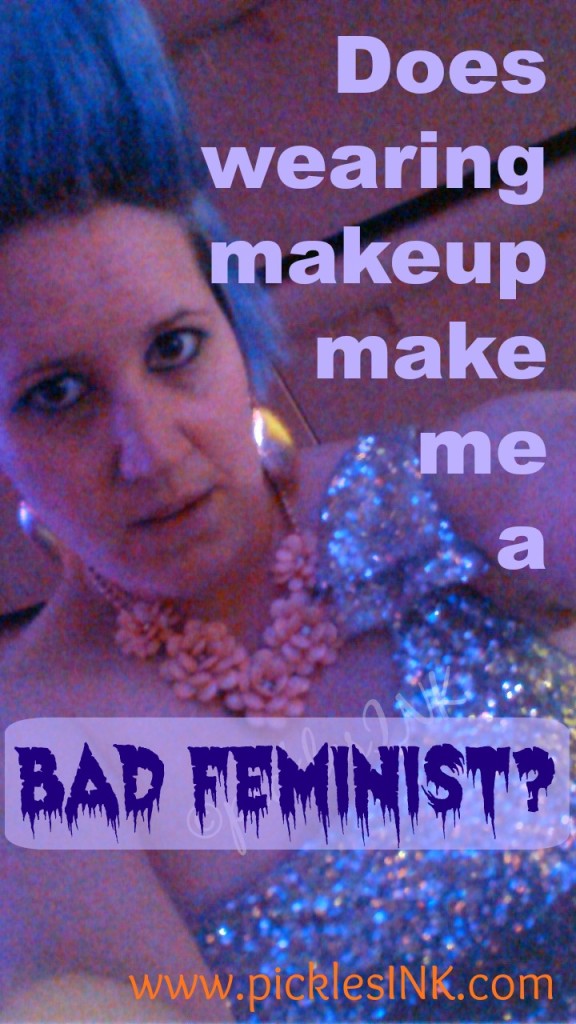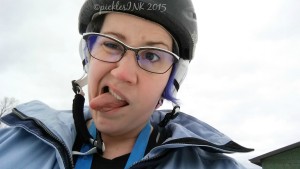I’ve been seeing this post about a daughter’s questions about her mom’s makeup in my news feed recently, and it’s made me think. Christine Burke describes how her daughter’s simple question made her see herself through a 7 year-old’s eyes and examine why she spent so much time and effort contouring, highlighting, plucking, cleansing, and otherwise enhancing her looks.

Does wearing makeup make me a bad feminist?
I wear makeup…not every day, but then, I work from home, so half the time I don’t put on my clothes, let alone my face. But if I’m going out…and I have time…and I remember…I’ll do my makeup. And I love buying the stuff…few things make me happier than finding a new brightly-coloured liquid eyeliner!
But what message am I sending my kids? Am I teaching Molly that women need to correct or enhance their natural features? That her own face isn’t good enough? That to live as a woman means constantly being evaluated against society’s standards of beauty and modesty – not too much, but not too little either…skirt *juusst* long and short enough to demonstrate that you’re neither a slut nor a prude; “bare-faced” makeup that makes you look exactly like you aren’t wearing makeup without looking like you do when you aren’t wearing makeup…
***Spoiler Alert*** Unfortunately, that last one *is* true.
And what about our boys? Am I teaching Ben to idealize a particular set of beauty standards?And to expect a certain level of effort from the girls and women in his life? That he should judge them by the amount of pride they take in their appearance, as evidenced by the time they spend curating it?
Intersectional or “third-wave” feminism seeks to dismantle ALL of the systemic oppressions that impact ALL people. As A. Lynn of Nerdy Feminist puts it, “When you enter a feminist space and you are only concerned about sexism, you are missing the full story.” Read the rest of her fantastic post, Intersectionalism 101, here. Go on. I’ll wait.
When it comes to our society’s standards of women’s beauty (which are influenced by a multitude of factors, including sexism, racism, whiteness, tokenism, ablism, transphobia, fatphobia, homophobia, rape culture, slut-shaming and which are marketed through mass-media and passed down through generations) there is only so much we can do on a micro level to influence our kids one way or the other.
But we can do that much.
We can expose those arbitrary standards for what they are – arbitrary standards. We can celebrate all kinds of beauty and focus on characteristics other than “beauty.” And we can frame discussions about our bodies, hair, and faces in terms of our own choices and desires rather than how other people see us.
For example: Ian and I have both put on a fair bit of weight in the last decade, and it has gotten to a point for both of us where we feel unhappy with our body shapes, the way we feel in clothing, and the ease with which we can participate in physical activity. In the absence of factors outside of our control (undiagnosed or diagnosed medical issues, economic barriers) it comes down to a pretty simple equation for the two of us: too much food + not enough exercise = increased weight + decreased fitness
We have been very open about this with Ben and Molly. We have said that we are fatter than we used to be because we have been choosing too many treats and not enough healthier food and because we do not do enough physical activity, and we want to change those habits. Ben and Molly are all for the change. Ben also wants to eat more healthy food so he can get stronger and run faster at school. Molly has taken to packing herself a “healthy snack” to eat after school (today it was a mix of cereal and cherry tomatoes). The other night they took turns teaching us dance moves and yoga poses.
In general, I don’t hate the way I look. I have curves (lots of them) and I feel good about them. I freaking LOVE my hair and my face is nothing to sneer at, with big brown eyes, ski jump nose, and ability to make extremely silly expressions.
I do hate the fact that the body I have now is the result of mindlessly snacking when I’m not actually hungry and sitting at a computer for hours on end and prioritizing playing on Facebook over playing outside. Those are things I would like to change, and if all goes according to plan, an indicator of my success will be a decrease in clothing size.
It’s the same thing with makeup. Many of the responses I’ve seen to Christine Burke’s post refer to “needing” makeup – things like “I wear it so I don’t spend the whole day listening to people tell me I look so tired,” and, “I tell my daughter she probably won’t need it until she’s older.”
In the post I referenced earlier, author Christine Burke relates her reply to her daughter’s question:
I look into her clear, freckled face and simply say, “I wear makeup because it tells the story of my face in color”.
And I hope my answer enough for now and I pray that she can’t see the lie through my makeup.
Her words make me want to smile and weep at the same time, because her response is playful and alive and naturally flawless. I just wish she had believed it herself.
When Molly asks me, “Why are you putting that stuff on?” I say, “Because I like to.” When she says, “What’s that blue thing for?” I say, “To make my eyelids blue.” When she says, “Can I have blue eyelids?” I say, “Sure. Hold still!”
Because what I want my children learn from me is not that “true” beauty is natural and youthful and free from artificial enhancements until you’re old enough to need them. I want them to learn that true beauty is enjoying and loving yourself the just way you are – makeup and all.
~ karyn

It is a topic that is both simple and remarkably convoluted. Nicely said. Ellen
Kids ask the best questions.
Great article. Wow, that last quote by Christine Burke.
Could you do an article about grammar? Today on radio 1 I heard a call in about common grammar mistakes – irregardless, could of, your/you’re, etc..!
Someone suggested that we’ve got to just accept the incorrect/common/current usage of “begs the question” as the new norm and let go of the proper usage. (I can never remember the proper usage but I know how not to use it!)
Peace
Children sure are honest and adorable creatures. Beautiful post! Keep on posting related topics. And no, wearing make up doesn’t make you a bad feminist parent.